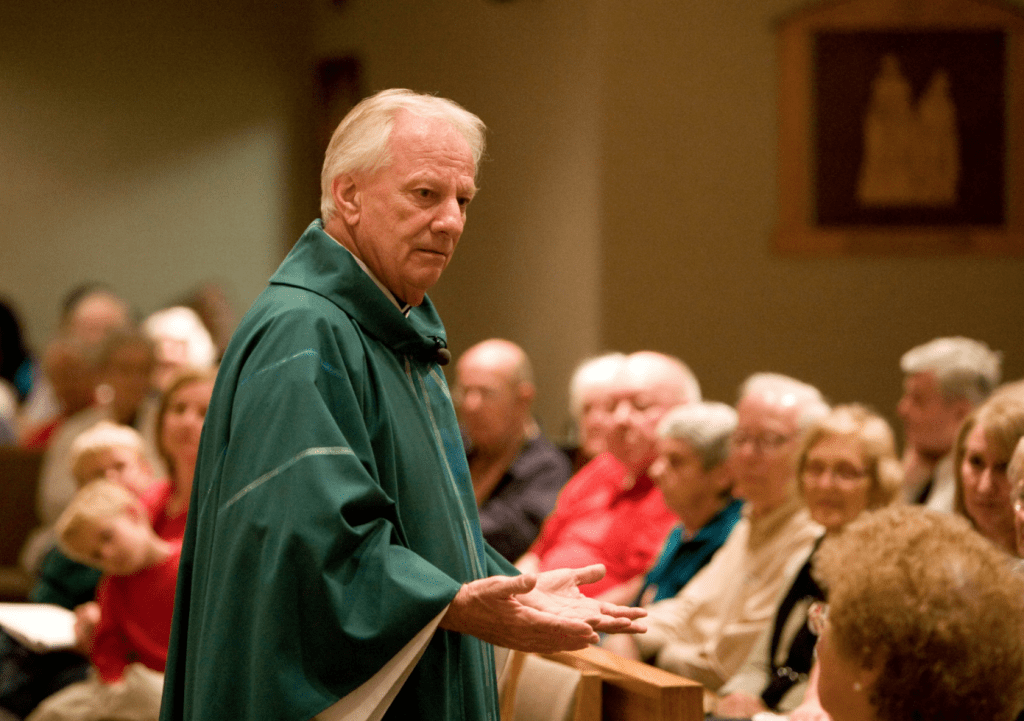 As religious communities struggle to make sense of violence and killings at home and abroad, clergy members deliver difficult words about mercy and ‘the holiness of all.’
As religious communities struggle to make sense of violence and killings at home and abroad, clergy members deliver difficult words about mercy and ‘the holiness of all.’
Many famvin visitors, especially among the Ladies of Charity USA, recognize Fr. Richard Gielow, CM as the beloved and featured speaker at so many of their National Assemblies. Many might be surprised to find him featured so prominently in a Wall Street Journal article with the headline “Preaching a Message Some Don’t Want to Hear”
In between two Sunday masses, the Rev. Richard Gielow turned on the TV to check the scores from the British Open and saw a news flash: Three police officers had been shot in Baton Rouge, La. “Oh my God. It happened again,” he said to himself. He returned to church for the next mass, stood before the congregation and asked the question he believed was on all of their minds: “When is all this going to stop?”
Across the country, many priests, rabbis, pastors and other congregation leaders are connecting scripture meditations with reflections on this summer’s string of violent attacks, in religious services and posts on Facebook and Twitter…There is a risk when clergy members venture into heated subjects. Some members of their congregations want worship services to be a peaceful refuge and don’t want to hear about unsettling current events. Some might get defensive if they feel they are being told what to think or how to feel from the pulpit. For these reasons and others, many clergy have limited mentions of domestic and international violence to requests for prayers for victims and their families.
“It’s always an artful balance to pray and preach with Bible in one hand and the newspaper in the other,” says the Rev. James Martin, a Jesuit priest.
The author of the article, Clare Ansberry (Clare.ansberry@wsj.com), interviewed the pastor of the Big Bethel African Methodist Episcopal Church in Atlanta, a rabbi at Congregation Beth El in South Orange, N.J. and a Pastor at the Pilgrim Church, a United Church of Christ in Birmingham, Ala.
The article however, focuses on Father Richard Gielow, CM director of the Vincentian Parish Mission Center based in Independence, Mo.
Mercy is a timely message, he says, because there is so much to forgive. It is also difficult because the offenses are violent and senseless. “I really believe forgiveness is the most difficult challenge of a Christian,” he says. It took him 14 years, he says, to forgive a grade-school teacher.
He said he felt compelled to address violence after the July 14 Nice attack, and even more so after the series of shootings of African Americans and police officers that followed, including the shooting in Baton Rouge.
The only way the random violence will stop, he told his congregation, is if people stop hating and start forgiving. “You want to make a difference in the world? Be merciful,” he said.
Bonnie Graf listened. She said she felt inspired and less helpless after hearing his message. “It’s very hard to forgive, but if I dwell deep enough, I can,” she says.
- Do Vincentians want to make a difference in the world?
- How deep can we Vincentians reach?
- How deep must we Vincentians reach?
PS Father Dick and his identical twin who also is a Vincentian priest, Father Bob, direct parish retreats and novenas around the country. Father Dick, who also is a high-school principal and chaplain for the Chicago Bears, doesn’t write out his homilies, working instead off a mental outline structured like a wheel, with one main idea and several spokes.







0 Comments